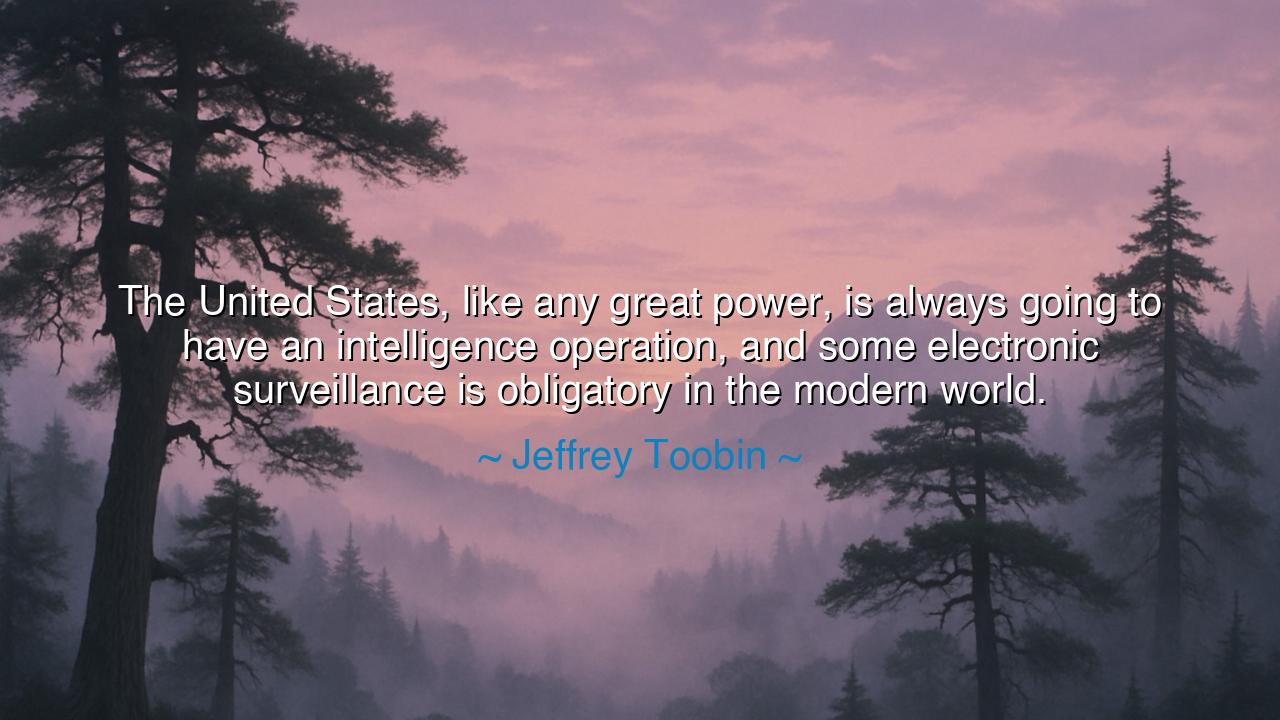
The United States, like any great power, is always going to have
The United States, like any great power, is always going to have an intelligence operation, and some electronic surveillance is obligatory in the modern world.






“The United States, like any great power, is always going to have an intelligence operation, and some electronic surveillance is obligatory in the modern world.” — Jeffrey Toobin
In these sober and clear-eyed words, Jeffrey Toobin, a chronicler of law and power, speaks to the unchanging truth of nations — that knowledge is the lifeblood of security, and intelligence, whether gathered through whispers or wires, is the unseen armor of every empire. His words carry neither judgment nor celebration, but the cool recognition of necessity: that in the modern world, where power is measured not only by armies but by information, surveillance is no longer an indulgence of the mighty, but a duty of survival. What was once the realm of spies and shadows has now become the pulse of civilization itself.
The origin of this quote lies in Toobin’s reflections on the ever-expanding reach of government intelligence in the digital age — a world where messages move at the speed of light, and secrets are stored not in vaults but in clouds. As a legal scholar and journalist, Toobin has often wrestled with the tension between liberty and security, between the right to privacy and the need for protection. His statement does not justify excess, but acknowledges reality: that the United States, like all great powers before it, must guard its interests through vigilance. In an age of invisible threats — cyberwarfare, espionage, terrorism — electronic surveillance is not merely a tool, but a shield.
To understand this wisdom, one must look to history, for every empire that has risen knew that strength alone could not preserve its dominion. The ancient Romans, whose legions stretched across the known world, also kept vast networks of scouts, informers, and spies. Augustus Caesar, the first emperor, built not only roads and laws but an intricate web of intelligence to hold his empire together. And centuries later, in the crucible of the Cold War, when the world trembled between superpowers, intelligence became the battlefield itself. Satellites replaced scouts, codebreakers replaced messengers, and the whisper of a signal across the sky carried the fate of nations.
Consider the story of the Cuban Missile Crisis of 1962, when the United States discovered Soviet nuclear weapons hidden upon the island of Cuba. It was intelligence, not force, that first revealed the danger — a set of grainy photographs taken by high-flying U-2 planes. Those images, gathered through the quiet patience of surveillance, saved the world from destruction. The missiles were seen, the truth unveiled, and the confrontation guided toward peace. Here, Toobin’s words find living proof: that intelligence is the conscience of power, and without it, strength becomes blind.
Yet his words also hold warning. For if surveillance is “obligatory,” then wisdom is even more so. The ancients taught that knowledge without virtue is perilous, that the sword of truth must be guided by the hand of justice. The same power that guards a nation can, if misused, enslave it. The modern world, filled with invisible eyes and silent listeners, demands not only vigilance against enemies abroad, but integrity among leaders at home. For the danger is not that intelligence exists — but that it may forget its purpose: to protect the people, not to control them.
Thus, Toobin’s quote speaks not only to governments, but to all who hold responsibility. In every sphere — from nations to individuals — knowledge brings both strength and temptation. The wise ruler, the thoughtful leader, the ethical citizen — all must remember that with the power to see comes the duty to respect what is seen. The invisible tools of surveillance, like the ancient oracles of old, must be used with humility, not arrogance. For to know all things and respect nothing is to invite ruin.
The lesson, therefore, is one of balance. Power without intelligence is fragile; intelligence without morality is dangerous. In the age of technology, where every word can be traced and every secret uncovered, we must learn again the ancient virtues of prudence, restraint, and honor. Let the guardians of nations remember that the greatest security lies not only in data, but in trust — not only in vigilance, but in justice.
So, my children of the digital age, remember this teaching of Jeffrey Toobin: that the world’s safety now rests not on the walls we build, but on the wisdom with which we wield knowledge. The great powers will always watch, for watching is part of survival. But let them watch with conscience. Let them remember that to see everything is not to understand everything — and that the highest intelligence is not the collection of secrets, but the preservation of truth.






AAdministratorAdministrator
Welcome, honored guests. Please leave a comment, we will respond soon